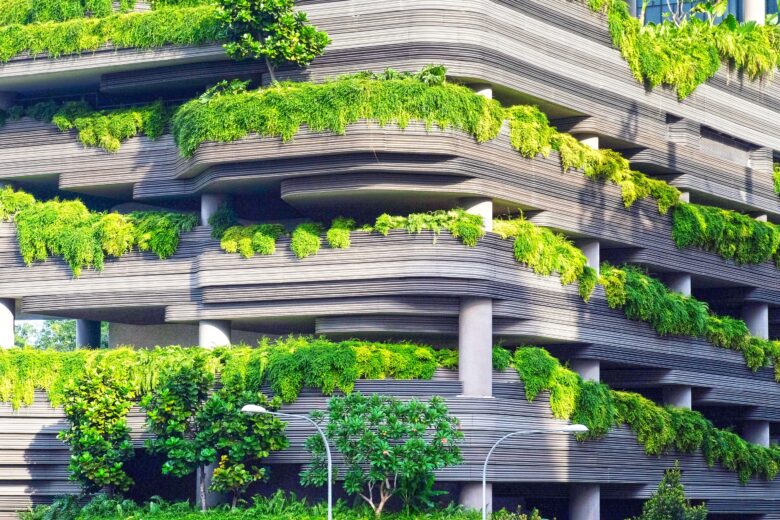In a bustling world full of concrete jungles and steel structures, there’s a dire need to reconnect with nature. As humans, we innately crave the touch of greenery, the whisper of leaves, and the serenity that only a garden can provide. But what if we challenged conventional gardening norms and took it to new heights? Literally. Imagine transforming bare walls into lush canvases, allowing nature to unfurl in the most unexpected places. Welcome to the mesmerizing world of hanging gardens, where vertical green spaces redefine the possibilities of botanical beauty. In this article, we explore the enchanting charm and remarkable artistry behind these flourishing masterpieces, unraveling the secrets to creating your very own verdant sanctuary in the sky. So, fasten your seatbelts as we embark on a journey that defies gravity and ignites the soul, revealing the captivating allure of hanging gardens.
Reviving Urban Spaces: Exploring the Allure of Hanging Gardens
Hanging gardens have long been an enchanting feature in urban landscapes, adding a touch of magic to concrete jungles. These vertical green spaces have the power to transform barren walls into vibrant masterpieces, breathing life into once-dull surroundings. From ancient wonders like the Hanging Gardens of Babylon to modern marvels like the Bosco Verticale in Milan, these elevated gardens continue to captivate and inspire.
One of the key allurements of hanging gardens is their ability to maximize the use of limited urban space. In a world where real estate is at a premium, these gardens provide a solution for city dwellers yearning for a connection with nature. By utilizing vertical walls, balconies, and rooftops, urban areas can embrace these bountiful gardens and create a visually stunning ecosystem.
Beyond their aesthetic charm, hanging gardens offer a myriad of benefits to the environment and the community. These green sanctuaries help combat air pollution by absorbing carbon dioxide and releasing oxygen. The foliage also provides insulation, reducing energy consumption and the urban heat island effect. Furthermore, the presence of vertical greenery enhances biodiversity, acting as a haven for birds, bees, and other urban wildlife.
Benefits of Hanging Gardens
- Increase biodiversity in urban areas
- Enhance air quality by absorbing carbon dioxide
- Reduce energy consumption by providing insulation
- Add aesthetic value and visual appeal to urban landscapes
- Create opportunities for urban farming and community gardens
Hanging Gardens Around the World
| Location | Notable Features |
|---|---|
| Singapore | Gardens by the Bay – Supertrees with vertical gardens |
| Paris, France | Musée du Quai Branly – Vegetated facade blending art and nature |
| Chicago, USA | The Chicago Cultural Center – Lush Living Wall installation |
Unleashing the Potential: How Vertical Green Spaces Transform Cities
The Charm of Hanging Gardens: Creating Vertical Green Spaces
Adorning concrete jungles with lush greenery has become more than just an aesthetic choice; it’s a way to transform cities into livable, sustainable spaces. Vertical green spaces, often referred to as hanging gardens or living walls, are revolutionizing urban landscapes, bringing nature back to the heart of our bustling metropolises.
One of the most fascinating aspects of vertical green spaces is their ability to unleash the potential of otherwise unused areas. Buildings can now sprout verdant facades, balconies can transform into mini-forests, and even the sides of highways can be covered in a tapestry of flora. This innovative approach not only brings visual charm to cities but also contributes to air purification and noise reduction. Green walls act as natural air filters, absorbing pollutants and releasing oxygen, creating a refreshing and healthier environment for residents and visitors alike.
Vertical green spaces also play a significant role in biodiversity conservation. By introducing diverse plant species into urban areas, we can restore habitats for birds, butterflies, and other urban wildlife that have been displaced by human expansion. These green oases provide both shelter and food sources, contributing to the overall ecological balance. Furthermore, such spaces help mitigate the urban heat island effect, reducing the need for excessive air conditioning and subsequently lowering energy consumption and carbon emissions.
Discover the transformative power of vertical green spaces and witness how they work wonders in our cities. Embrace the charm of hanging gardens and experience the harmonious blend of nature and architecture, as these living walls redefine urban living. Let’s continue to unlock the potential of our cities by incorporating vertical green spaces, creating sustainable and vibrant environments for generations to come.
Designing Vertical Gardens: Techniques and Tips for Maximizing Charm and Functionality
The Charm of Hanging Gardens: Creating Vertical Green Spaces
Vertical gardens, also known as hanging gardens, have become a popular choice for both indoor and outdoor spaces. They not only maximize charm but also offer unique functionality. Through creative techniques and careful planning, you can transform any dull wall or empty space into a lush green oasis. In this post, we will explore some techniques and share tips for designing vertical gardens that will captivate and enhance your surroundings.
Utilize Different Plant Varieties
One of the key aspects of designing a captivating vertical garden is to choose a diverse range of plants. Incorporate various types, shapes, and colors to add visual interest and create a harmonious tapestry of greenery. Consider using climbing plants, such as ivy or jasmine, to allow them to gracefully cascade down and add depth to your garden. Mix in smaller flowering plants or succulents to bring vibrant colors and textures to the vertical landscape.
Tips:
- Select plants that thrive in your specific environment – consider light conditions, temperature, and humidity.
- Create contrast by mixing plants with different foliage shapes and sizes.
- Make use of hanging pots or wall-mounted planters to add versatility and adaptability to your vertical garden.
Consider Functional Elements
Designing a vertical garden goes beyond aesthetics, it can also serve practical purposes. Incorporating functional elements can maximize the versatility and usefulness of your green space. For instance, you can include a vertical herb garden in your kitchen, providing easy access to fresh ingredients while adding a delightful touch to your cooking area. Additionally, vertical gardens can act as a natural privacy screen or sound buffer, enhancing the tranquility of your outdoor living space.
Tips:
- Choose edible plants for an herb or vegetable garden, ensuring you have the appropriate growing conditions and adequate drainage.
- Consider incorporating a water feature, such as a cascading fountain, to bring soothing sounds and visually pleasing elements to your vertical garden.
- Add vertical plant racks or shelves to display decorative items or store gardening tools, maximizing the functionality of your green space.
Maintaining and Nurturing Your Vertical Garden
Once you have created your enchanting vertical garden, it is crucial to maintain its beauty and keep it thriving. Proper care and regular maintenance are essential for the longevity of your plants. Regularly check for pests, water your plants adequately, and provide them with proper nutrition. Pruning and trimming will help shape your garden and prevent overcrowding. Remember to rotate your plants periodically to ensure even growth and prevent certain areas from overshadowing others.
Tips:
- Establish a watering schedule based on plant needs and monitor soil moisture regularly.
- Use organic fertilizers to nourish your plants and provide essential nutrients.
- Regularly inspect your vertical garden for signs of pests or diseases and take appropriate measures to mitigate their impact.
Plant Selection for Hanging Gardens: Creating Lush and Vibrant Vertical Oases
The Charm of Hanging Gardens: Creating Vertical Green Spaces
When it comes to gardening, there’s something truly enchanting about hanging gardens. These captivating vertical green spaces not only add a touch of charm and beauty to any environment but also maximize the use of limited space. Whether you have a small balcony, a narrow courtyard, or even a spacious backyard, creating a lush and vibrant hanging garden can transform any area into a breathtaking oasis.
To create a show-stopping hanging garden, the key lies in selecting the right plants. Opt for plants that thrive in vertical conditions and have cascading, trailing, or climbing characteristics. Some ideal choices include:
- Trailing Ivy: This versatile plant is perfect for adding a luscious green backdrop. Its delicate foliage elegantly drapes down from hanging baskets, creating a stunning visual effect.
- Petunias: These colorful annuals are well-suited for hanging gardens. Their vibrant blooms come in a wide array of hues, making them a popular choice for adding bursts of color to any vertical space.
- Spider Plants: With their long, arching leaves adorned with white stripes, spider plants bring a touch of elegance to hanging gardens. These easy-to-care-for plants thrive in both indoor and outdoor settings, making them a versatile choice.
- Trailing Succulents: Succulents are known for their resilience and low maintenance, making them an excellent choice for busy gardeners. Their unique and varied shapes add texture and interest to hanging gardens.
Remember to consider factors such as sunlight, water requirements, and climate suitability when selecting plants for your vertical oasis. By carefully curating a diverse collection of plants, you’ll create a visually stunning hanging garden that bursts with life, color, and greenery all year round.
Maintenance and Care: Ensuring Longevity and Beauty in Vertical Green Spaces
The Charm of Hanging Gardens: Creating Vertical Green Spaces
Hanging gardens are a captivating and innovative way to bring nature into urban spaces. Not only do they add a touch of charm and beauty, but they also provide numerous benefits to both the environment and the people who enjoy them. To ensure the longevity and beauty of these vertical green spaces, it is essential to implement proper maintenance and care practices.
Here are some tips to help you maintain and care for your hanging gardens:
- Regular watering: Adequate watering is crucial for the health and survival of the plants. Remember to water them regularly, especially during dry and hot periods. Use a watering can or a specialized irrigation system to ensure each plant receives the necessary amount of water.
- Pruning and trimming: Keeping the plants properly pruned and trimmed will not only enhance the visual appeal of your hanging garden but also promote healthier growth. Remove dead or decaying leaves, branches, and flowers regularly to prevent diseases and pests from spreading.
- Fertilization: Provide essential nutrients to your plants by fertilizing them at regular intervals. Choose a high-quality organic fertilizer and follow the manufacturer’s instructions for the correct dosage. Be cautious not to over-fertilize, as it can harm the plants.
In addition to these general care practices, it is crucial to assess the specific needs of the plants you have chosen for your hanging garden. Some plants may require more sunlight, while others thrive in shady areas. Make sure to position your garden correctly and consider the light, temperature, and humidity conditions of your space.
| Plant | Light Requirements | Watering Frequency |
|---|---|---|
| Pothos | Indirect sunlight | Once a week |
| Spider Plant | Bright, indirect light | Twice a week |
| Succulents | Full sun | Every two weeks |
By following these maintenance and care practices, your hanging garden will continue to flourish and provide you with a mesmerizing vertical oasis. Enjoy the charm and beauty of these green spaces while contributing to a more sustainable and nature-friendly urban environment.
In an urban jungle where concrete reigns supreme, a touch of greenery emits an ethereal charm that captivates the senses and soothes the soul. In our quest for tranquility amidst the chaos of city life, we have delved into the enchanting realm of hanging gardens – nature’s very own vertical sanctuary.
Just imagine strolling through a labyrinth of flourishing plants as they gracefully dangle from above, creating cascades of color and life. The allure of hanging gardens lies not only in their aesthetic appeal but also in their ability to transform any space into a breathtaking oasis.
From ancient marvels like the legendary Hanging Gardens of Babylon to modern architectural wonders such as the awe-inspiring green walls of the iconic Bosco Verticale in Milan, these suspended green spaces have stood the test of time. Their allure is timeless, a testament to our innate longing for nature’s embrace.
Creating a vertical garden does not require a vast expanse of land; it merely demands a dash of creativity and a touch of determination. With the right combination of plants, imagination, and careful planning, anyone can bring this captivating vision to life.
The benefits of vertical green spaces extend far beyond their sheer beauty. They act as natural air purifiers, filtering out toxins and releasing fresh oxygen into the atmosphere. Moreover, these mesmerizing green walls can help attenuate noise pollution, creating a haven of tranquility amidst the city’s clamor.
Whether adorning the walls of a bustling café, transforming a concrete rooftop into a paradise, or delicately whispering life into a compact balcony, hanging gardens have the power to elevate the mundane into the extraordinary.
As we conclude this journey through the charm of hanging gardens, let us be reminded of the magical allure they hold. These vertical green spaces encapsulate the essence of nature, offering us refuge from the concrete confines of city life.
So, dare to dream, dear readers, dare to imagine verdant vines intertwining, blooming flowers cascading, and lush foliage whispering secrets of serenity. Embrace the magic of hanging gardens, and let them weave a spell that breathes life into the urban landscape. For in their artful ascent towards the heavens, hanging gardens infuse our surroundings with the beauty and wonder of nature itself.



